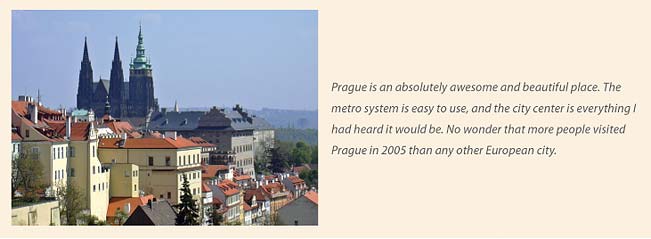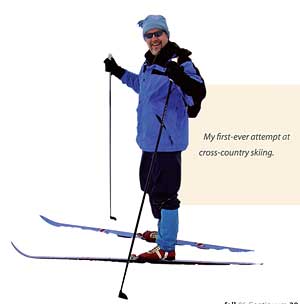

Czech List
“Travels with the Principal” chronicles my seven-week journey of exploration and discovery abroad.
by Jeffrey Herr
Among the burning questions I have are: What do Czech or Italian or Russian fifth-graders study? What do their schools look like? Are their principals or headmasters grumpy and lazy, or smiling and hard-working?
As an administrator in the Salt Lake City School District who also happens to be afflicted with wanderlust, I was recently given a chance to find answers to some of these questions and more. The opportunity was provided by the United States Fulbright Commission when I was selected to study the educational system in the Czech Republic for six weeks during the 2005-06 academic year.
Applicants for a Fulbright are required to list three country choices. Since I am interested in seeing how the newfound freedoms have affected the educational systems in the former European communist bloc countries, I chose the Czech Republic (a free trip to Prague couldn’t be a bad thing, I figured), Romania, and Lithuania. The CR won out.
The Fulbright recipient from the Czech Republic chosen to partner with me (to serve as host and guide) was Josef Janků, deputy headmaster of Střední průmyslová škola chemická (Secondary Chemistry School) in Brno.
Brno, you say? As a former history teacher, I knew where Brno was but not what it was. In fact, Brno is the second largest city in the Czech Republic. With a population of 400,000, it is the capital of Moravia, one of the country’s three regions, located two and a half hours southeast of Prague.
The Střední is a secondary school (educating grades 9-12) specializing in vocational preparation for the chemical industry and academic preparation for the university level. While in Brno, I was housed at the faculty dormitory of the Communications Vocational School, which focuses on technology and telecommunications.
Following are modified excerpts, both educational and travel-related, from my daily blog, which can be found at www.travelswiththeprincipal.com.
 March 20 March 20
Today was my first full day at the school, which is small but clean. All the doors are locked, even the main office, and everyone, including students, must be buzzed in by the doorperson. This security frenzy started after September 11. I told Josef that locking the doors would not fly in America because everyone there feels a sense of ownership. He found the public’s insistence on having accessibility to everything nerve-racking.
Josef’s school is run like a business, yet the place is warm and friendly. Here, administrators also teach. I will be teaching some English classes starting tomorrow.
March 21
I woke up with a bit of a stomachache from nerves, mostly because I haven’t taught for about 10 years.
But I miss the classroom and realize that I could evaluate teachers better if I were teaching myself.
I will teach about 10 hours a week and help fill in as a substitute as part of my administrative duties. The classes are 45 minutes each, except for chemistry labs, which can be as long as four hours because of the hands-on exercises.
March 22
Today was a day of strange food. Breakfast was raisin bread with butter and honey, and a dish called “Russian Eggs” made of shredded ham with a sliced egg on top. The ham/egg comes in loaf form and is supposed to be eaten with a spoon. The loaf is held together by a gelatin-type substance, similar to that found in a canned ham or Spam. Amazingly, it wasn’t bad—not that I would like to have it every day.
Lunch was another surprise: potato noodles topped with a mixture of cinnamon, sugar, chopped nuts, and butter. Josef explained that once a week school cafeterias are required to serve a sweet main dish to satisfy federal nutrition guidelines. It was quite tasty, and I would certainly eat it again.
I taught twice today, substituting for an older teacher who is dealing with health problems. What’s really cool is that the students stand when an adult enters the room. A student explained that it is done out of respect for the teacher’s position.
March 25
Saturday. Josef and I left at 8 a.m. for a two-hour train ride to the town of Nové Město to cross-country ski, which I had never done before. I am now convinced that cross-country skiers are the best-conditioned athletes in the world. It’s a very popular sport in the Czech Republic, which explains why the Czechs are good at it and we aren’t. I was being passed by children too young to walk and old people on oxygen tanks. We put in 15 kilometers and I pulled every known muscle in my body and a few I wasn’t aware existed.
April 1
I met Josef and our tech guy, Roman, downtown for the bus ride to Prague. The bus, run by the Student Agency, is the epitome of luxurious travel. It offers free coffee/tea/hot chocolate, and movies and/or music on multiple screens, all at a great price—cheaper than the train, and faster.
I sat next to a pleasant young woman, Veronica, who will work at the Grand Canyon this summer with her boyfriend. Her English was quite good, and I got to practice my Czech. She asked me about things to see in California and New York, including the World Trade Center Memorial. Suddenly I lost my composure. She was very apologetic, but I told her not to be, explaining that some things are very close to the hearts of Americans.
In Prague we stored our largest bags, but the theft and pickpocket problem is so bad that I had to lug around my camera bag and heavy attaché case.
Prague is an absolutely awesome and beautiful place. The metro system is easy to
use, and the city center is everything I had heard it would be. No wonder that more people visited Prague
in 2005 than any other European city.
April 17
Velikonocni Pondělí, or Easter Monday, is a huge holiday in Europe, especially in the Czech Republic, which has a most unusual tradition. Men and boys use a special handmade whip (pomlázka) decorated with ribbons to thrash women on their bottoms. The boys usually accompany the whipping with a rhythmic chant and then are given a treat. This is a rite used to ensure that women will be fertile, and it’s considered bad luck if it isn’t done. In an unofficial poll, I found that most girls didn’t care for the ritual, but they all indicated they accepted the tradition.
For each woman a man whips, a ribbon is tied to his pomlázka. I noticed one fellow who had accumulated more than 200 ribbons. Wow.
This is a busy day for the policie, as it is also a day of heavy alcoholic consumption. Drunken men reminded me of deer-hunting season in Utah—you know, the time-honored tradition of combining beer and rifles in pursuit of a fleet-footed animal.
This is also a day for eating. Czechs enjoy their food and love to share it with company. They clean their plates, and you are expected to do the same as it is considered rude not to. Czech food is výborný (excellent) and lahodný (delicious), and by not sampling the local cuisine, you miss one of the most important components of the culture.
May 5
Today is my last official day in the Czech Republic. One of the most important things I have learned here is that some things are the same regardless of country, language, or culture. Kids are cute and wide-eyed about learning; teachers are passionate about teaching; parents worry about their children’s future; and administrators must still toe the bottom line. The goal of education never changes: to enrich young minds and prepare them for the future. — Jeffrey Herr MA’96 is an assistant principal at East High School in Salt Lake City. He has a “beautiful wife,” Debbie, four children, and two Labrador retrievers.
Return to Fall 2006 Table of Contents |



